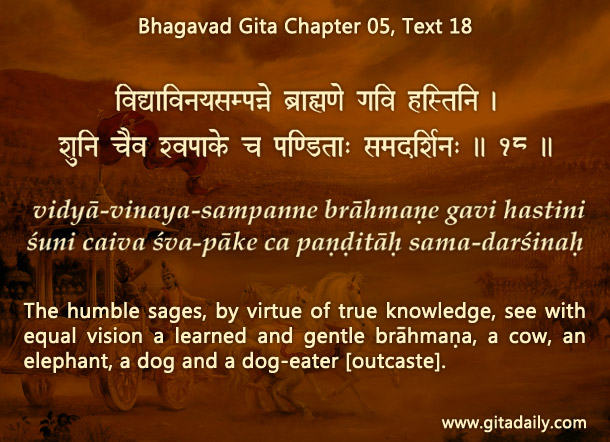An often-quoted Bhagavad-gita verse recommends equality of vision (05.18): see everyone equally, because we all are souls.
In the Gita’s immediate context, this verse raises perplexing questions for Arjuna. Is he meant to see Yudhishthira and Duryodhana equally? How can he when Yudhishthira is virtuous and Duryodhana vicious? And if he somehow sees both equally, then why should he fight for one and against the other?
Such questions arise from two presumptions that need to be examined.
Does spiritual equality imply absolute equality? When we see everyone as spiritually equal, we no longer label people based solely on externals such as nationality, ethnicity, race or religion. Still, when we learn to see something more than our eyes show, that doesn’t mean we stop seeing what our eyes show: that people have real and consequential differences at behavioral, emotional and ethical levels.
Does equality of vision imply equality of action? If it did, that would make Arjuna’s social role as a kshatriya (martial protector of society) redundant. If both the attacker and the attacked are to be treated equally, then why punish the attacker and protect the attacked? Actually, failing to differentiate between the attacker and the attacked would disrupt and destroy dharma, the social order that facilitates everyone’s progress toward realizing their spirituality. When we see everyone’s spiritual equality, we are meant to act in a way that helps everyone actualize their spiritual potential. Hence, Arjuna needs to stop the vicious like Duryodhana and assist the virtuous like Yudhishthira.
Thus, spiritual knowledge is meant to change the basis of our interactions with others: we are no longer driven by our biases; instead, we act by considering everyone’s spiritual welfare.
One-sentence summary:
Seeing everyone’s spiritual equality is meant to expand our vision beyond our material biases; it is not meant to make us materially blind.
Think it over:
- Why does spiritual equality not imply absolute equality?
- Why does equality of vision not imply equality of action?
- How does spiritual knowledge change our interaction with others?
***
05.18: The humble sages, by virtue of true knowledge, see with equal vision a learned and gentle brahmaṇa, a cow, an elephant, a dog and a dog-eater [outcaste].
To know more about this verse, please click on the image


Leave A Comment